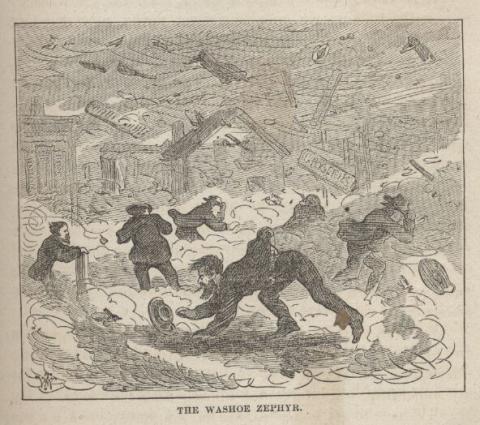"We arrived, disembarked, and the stage went on. It was a “wooden” town; its population two thousand souls. The main street consisted of four or five blocks of little white frame stores which were too high to sit down on, but not too high for various other purposes; in fact, hardly high enough. They were packed close together, side by side, as if room were scarce in that mighty plain.
The sidewalk was of boards that were more or less loose and inclined to rattle when walked upon. In the middle of the town, opposite the stores, was the “plaza” which is native to all towns beyond the Rocky Mountains—a large, unfenced, level vacancy, with a liberty pole in it, and very useful as a place for public auctions, horse trades, and mass meetings, and likewise for teamsters to camp in. Two other sides of the plaza were faced by stores, offices and stables.
The rest of Carson City was pretty scattering."
Orion and Sam, on arriving in Carson, were optimistic about their chances there. Orion expected to become an important government official and Sam expected to strike it rich. James W. Nye was then governor of the territory but reputedly felt that the job of being governor of the Territory of Nevada was only an interlude between his political activities in New York City and some position he would get out of creating a state of the Territory of Nevada. And when he found that living in frontier Carson City was a drab existence . . . he didn’t intend to spend any more time there than he could help. Orion served as acting governor during Nye’s frequent trips to California, Washington, D.C., and New York, the longest such substitution coming between December 1862 and July 1863 . Mollie, Orion's wife was eager to join her husband in Carson City, but was deterred by both Orion and Sam and because of the difficulty of finding a suitable traveling companion for the long trip to Nevada. In Sam's letter to Mollie, he writes:
Well, Mollie, I think July will be soon enough, because I think that by that time some of our claims will be paying handsomely, and you can come in “high-tone” style, as Tom Nye, says. And we could have a house fit to live in—and servants to do your work. You know it is all very well for a man’s wife to talk about how much work she can do—but actually doing it is a thing that don’t suit my notions. That part of the business belongs to the servants. I am not married yet, and I never will marry until I can afford to have servants enough to leave my wife in the position for which I designed her, viz:—as a companion. I don’t want to sleep with a three-fold Being who is cook, chambermaid and washerwoman all in one. I don’t mind sleeping with female servants as long as I am a bachelor—by no means—but after I marry, that sort of thing will be “played out,” you know. (But Lord bless you, Mollie, don’t hint this depravity to the girls.) No, Madam, I am anxious for you to stay just where you are until you can live here in a handsome house and boss your own servants—even if it should be until the first July after the Millenium! If you come here before you ought to come, Mollie, and I hear people say “the Secretary’s wife does her own cooking”—I’ll tell every such person that the Secretary’s wife is such subject to fits of derangement! Mind, now, I’m not going to have any one-horse business here after you arrive. D-o-n-’t get in a hurry, Madam. The world wasn’t made in a day.
See Mark Twain Project Letters
Clemens’s most difficult period in Nevada was the summer and early fall of 1862, which he spent prospecting near Aurora, in Esmeralda County, while desperately short of funds. Howland was among his partners then (L1, 214–41). In 1876 the Virginia City Territorial Enterprise recalled that “Bob and Mark were not flush” as cabin mates:
They lived principally on hardtack and beans. On Sundays, however, they managed to get hold of some few extras in the grub line. When Sunday came they feasted on canned oysters, canned turkey, chicken and the like, with something in the fruit and jelly line. When the cans had been emptied of these luxuries the “boys” ostentatiously threw them out in front of the door of their cabin.
In the course of a few weeks the accumulation of cans that had contained oysters, turkey, jellies and other good things began to attract attention. Miners passing their cabin used to gaze upon the many cans and say: “By Jove, those fellows live like fighting cocks!”
It was finally noised about the camp that Clemens and Howland lived like two princes—fared sumptuously every day. It was thought they never ate anything but oysters and turkey and they were looked upon as “Big Injuns” by the whole camp.
Anxious to preserve their reputation under the scrutiny of some suspicious miners, Clemens and Howland reportedly resorted to nocturnal foraging in garbage dumps to maintain their facade of empty cans (“How They Played It,” 28 Apr 76, 3).
SLC to Robert M. Howland, 1–6 or 12–21 June 1870, Buffalo, N.Y. (UCCL 00476), n. 1.
By August of 1862, Sam had given up hope of striking it rich with mining so he took a job as a Reporter for the Territorial Enterprise
